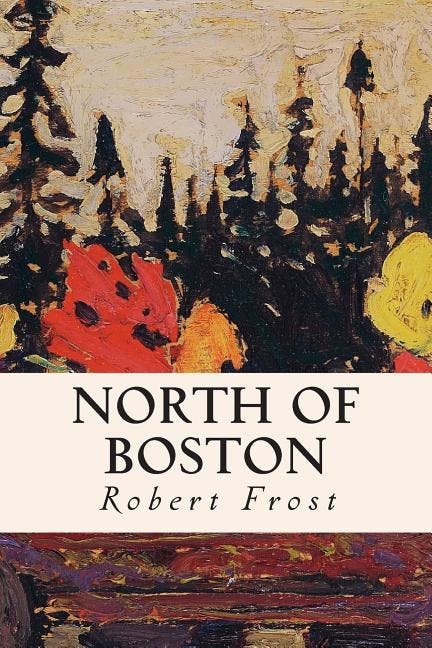

What's North of Boston About
North of Boston is a 1914 poetry collection by Robert Frost. It includes two of his most famous poems, “Mending Wall” and “After Apple-Picking”. Most of the poems resemble short dramas or dialogues.It is also called a book of people because most of the poems deal with New England themes and Yankees farmers. Ezra Pound has written a review of this collection in 1914.North of Boston was published by David Nutt. Following its success, Henry Holt and Company republished Frost’s first book, A Boy’s Will, in 1915. The New York Times said in a review, “In republishing his first book after his second, Mr. Robert Frost has undertaken the difficult task of competing with himself.”Contents: “The Pasture” (introductory poem)”Mending Wall””The Death of the Hired Man””The Mountain””A Hundred Collars””Home Burial””The Black Cottage””Blueberries””A Servant to Servants””After Apple-Picking””The Code””The Generations of Men””The Housekeeper””The Fear””The Self-seeker””The Wood-pile””Good Hours”Robert Lee Frost (March 26, 1874 - January 29, 1963) was an American poet. His work was initially published in England before it was published in America. Known for his realistic depictions of rural life and his command of American colloquial speech, [2] Frost frequently wrote about settings from rural life in New England in the early twentieth century, using them to examine complex social and philosophical themes.Frost was honored frequently during his lifetime and is the only poet to receive four Pulitzer Prizes for Poetry. He became one of America’s rare “public literary figures, almost an artistic institution.”[3] He was awarded the Congressional Gold Medal in 1960 for his poetic works. On July 22, 1961, Frost was named poet laureate of Vermont.Robert Frost was born in San Francisco, California, to journalist William Prescott Frost, Jr., and Isabelle Moodie.[2] His mother was a Scottish immigrant, and his father descended from Nicholas Frost of Tiverton, Devon, England, who had sailed to New Hampshire in 1634 on the Wolfrana.Frost was a descendant of Samuel Appleton, one of the early settlers of Ipswich, Massachusetts, and Rev. George Phillips, one of the early settlers of Watertown, Massachusetts.[4]Frost’s father was a teacher and later an editor of the San Francisco Evening Bulletin (which later merged with The San Francisco Examiner), and an unsuccessful candidate for city tax collector. After his death on May 5, 1885, the family moved across the country to Lawrence, Massachusetts, under the patronage of (Robert’s grandfather) William Frost, Sr., who was an overseer at a New England mill. Frost graduated from Lawrence High School in 1892.[5] Frost’s mother joined the Swedenborgian church and had him baptized in it, but he left it as an adult.Although known for his later association with rural life, Frost grew up in the city, and he published his first poem in his high school’s magazine. He attended Dartmouth College for two months, long enough to be accepted into the Theta Delta Chi fraternity. Frost returned home to teach and to work at various jobs, including helping his mother teach her class of unruly boys, delivering newspapers, and working in a factory maintaining carbon arc lamps. He did not enjoy these jobs, feeling his true calling was poetry.In 1894, he sold his first poem, “My Butterfly. An Elegy” (published in the November 8, 1894, edition of the New York Independent) for $15 ($434 today). Proud of his accomplishment, he proposed marriage to Elinor Miriam White, but she demurred, wanting to finish college (at St. Lawrence University) before they married. Frost then went on an excursion to the Great Dismal Swamp in Virginia and asked Elinor again upon his return. Having graduated, she agreed, and they were married at Lawrence, Massachusetts on December 19, 1895.
Reviews
Book Lists That Include North of Boston
The Creative Behind the Book
Robert Lee Frost was born on March 26th 1874 in San Francisco, California and died on January 29th, 1963 in Boston, Massachusetts. He won the Pulitzer Prize for poetry and was bestowed a Congressional Gold Medal, “in recognition of his poetry, which enriched the culture of the United States and the philosophy of the world.” On July 22, 1961 he was named Poet laureate of Vermont. His popularity is unmatched in the annals of American poetry; by the end of his life he had achieved the iconic status of “living legend.”
What Has Robert Frost Said About This Book
Nothing yet! Let Robert Frost know that you want to hear from them about their book.
More Books by Robert Frost
Book Details
- ISBN
- 9781501038761
- Publication Date
- September 2, 2014
- Publisher
- CreateSpace Independent Publishing Platform
- Original Publication Date
- January 1, 1914
- Page Count
- 126
- Audience
- Adult
Contribute to this page
Are you the author or illustrator? Claim your book.














